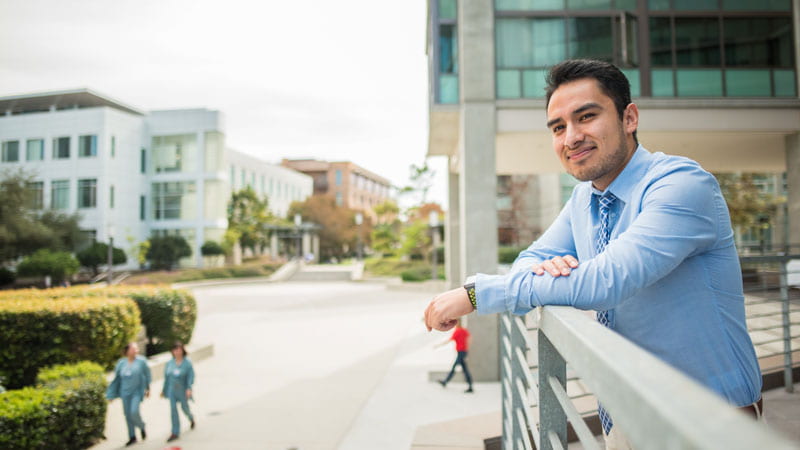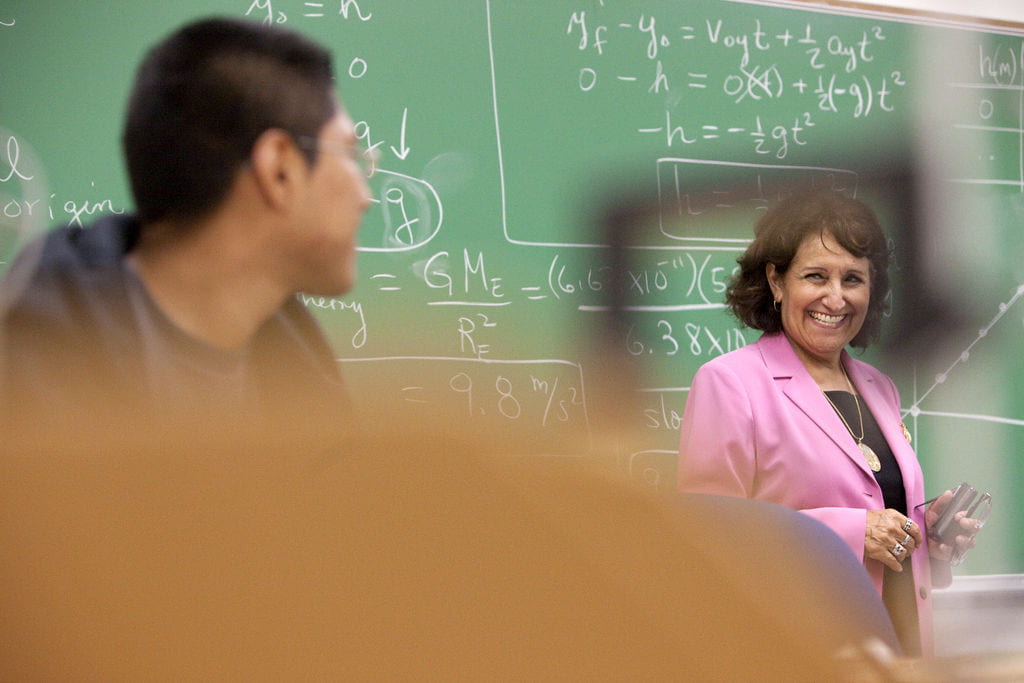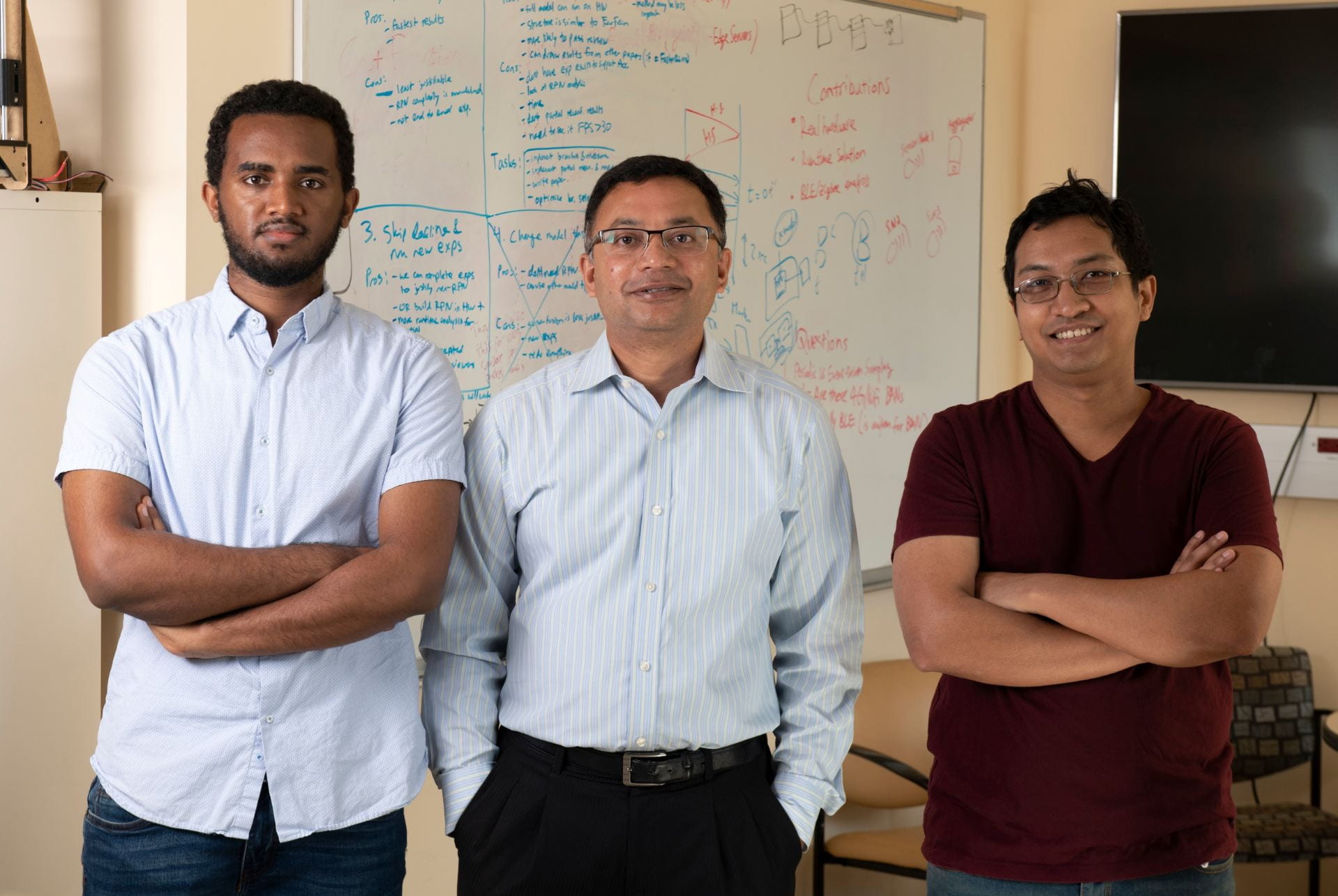The big residency reveal
For Match Day, we profile three graduating medical students on the cusp of starting their careers

On the morning of Friday, March 20, 91 graduating medical school students participated in annual Match Day activities, marking the beginning of their careers as doctors as they learn where they will serve as resident physicians after earning their M.D.s in May.
Because of social distancing policies in light of COVID-19, students shared news of their “matches” remotely on livestream video, but this did not dim the joy these future physicians shared with their classmates, family and friends. Of the 91 matchers, 17 will be joining residency programs at UCI. Together, UCI’s med school graduates placed with some of the finest teaching hospitals in the country, such as UCLA, Stanford and the Cleveland Clinic.
Here are three of their stories.
Serving family, country and the world
“My support system is also my motivating factor,” says graduating medical student Richelle Roelandt Homo, a second lieutenant in the U.S. Army. Because of her military affiliation, she will be heading to the Madigan Army Medical Center, near Tacoma, Washington, where she’ll train as a pediatrician. Her unconventional career choices stem from personal experiences.
Growing up in various places around the world due to financial instability, Homo lived in the Philippines during the 2004 Indian Ocean tsunami and the 2003 SARS outbreak. On 9/11, she was at a New York City hospital with her mother after the premature birth of her younger sister. It was in these periods of darkness that she witnessed the selflessness of healthcare workers.
Because Homo – who now resides in Irvine – has a younger brother with Down syndrome who requires a full-time caretaker and regular medications, she earned B.S. degrees in chemistry and biological sciences at UCI with an eye toward a career in pharmacy. However, Homo soon concluded that she could have a greater impact through more intimate patient interactions and decided to become a doctor.
During a clinical rotation in pediatrics, she found her calling. “It brought me back to how I’m taking care of my brother and how I’d want to be treated by my physicians,” Homo says. “I realized that this is what I wanted to do from the very beginning.”
After finishing her residency, she may be assigned to a U.S. hospital or clinic to care for the children of military members, or she could be deployed overseas with a unit as a battalion surgeon or as a pediatrician on a humanitarian mission.
Whatever the case, or however difficult, Homo will approach it with enthusiasm. “As soon as I walk through the hospital doors and start my day, I know I’m where I’m supposed to be,” she says, “and I’m so happy that I’m here. There’s no other profession I’d rather be in.”
Classmates on a mission
Isaure Hostetter, who matched into an internal medicine program at the Santa Clara Valley Medical Center, was raised in Italy and the U.S. by French-Italian and American parents. She grew up speaking Italian, French, English and, later on, Spanish, inspiring her to double major in Spanish and public health as an undergraduate at UC Berkeley. For medical school, UCI’s Program in Medical Education for the Latino Community was the perfect fit.
“After meeting some of the PRIME-LC students and the wonderful leadership and administrative support – who have been like a second family to me – it was a no-brainer,” says Hostetter, who now lives in Long Beach. “I came from the humanities, so medical school was a very difficult transition. I don’t think I would have gotten through it without them.”
The five-year program, which admits only about 12 Spanish-speaking students annually, culminates in both an M.D. and a master’s degree in a chosen field (even at another university). It encourages participants to go beyond the realm of medicine and become advocates for under-resourced Latino communities.
Hostetter used the opportunity to complete a Master of Public Health, with a concentration in health policy, at Harvard University. She says: “After conversations with my peer group and seeing the problems people in the Latino community have, I thought that as an ally with the privilege of looking how I look, sounding how I sound, and having the pedigree I’ve been fortunate enough to have acquired through academia, the best way I could help is by translating what’s important to folks into policies that shape our healthcare system.”
Ultimately, she says, “my hope is to continue to form that link between people working in the community and people doing policy work on a governmental level.”
Opening doors
Oscar Hernandez is also graduating with a dual degree – an M.D. and an MBA – through PRIME-LC. “I chose to do this to focus on becoming a surgeon who’s culturally sensitive and linguistically competent to address the specific needs of Latinos,” he says. “While medical school has developed my clinical skills, I sought an MBA to learn how to build, administer and sustain projects to improve access to higher education and expand surgical care in underserved communities.”
The School of Medicine’s first undocumented student, Hernandez is president of UCI’s Latino Medical Student Association and co-founder of the UCI chapter of the UndocuMed student organization. As an advocate for the Latino community, he knows better than most how difficult it can be for some people to access vital resources. Hernandez was brought to the U.S. when he was only 2 years old and is protected under the government’s Deferred Action for Childhood Arrivals program.
DACA recipients, however, are ineligible for federal financial aid and loans. Hernandez’s studies were often interrupted as he worked tirelessly to secure tuition through paid fellowships, merit-based scholarships, a crowdfunding campaign, and assistance from friends and family. Meanwhile, unstable immigration policies threatened to negate all that he had accomplished so far.
But Hernandez, who lives in Garden Grove, persevered. “My childhood trailer-park community taught me to define myself not by the obstacles I face, but by how I overcome them,” he says, “and each step on my journey has only solidified my resolve to give back to the underserved community that has taught me so much.”
Now, Hernandez says, “I look forward to evolving my dream in a residency center that values the power of diversity and helps me expand access to surgeries.”
His dream will continue with the general surgery residency program at the acclaimed Cleveland Clinic.
His advice for others following in his footsteps?
“There will be nights when you lie awake wondering how you can overcome the closed doors set in front of you. These barriers may be financial, immigration status, language, the color of your skin, or gender,” Hernandez says. “Close your eyes and wake up the next morning ready to become the best version of yourself, regardless of how you are identified.
w“The time will come when you and other warriors like you will open those doors, and you will be the most qualified individual to take that first step through.”


